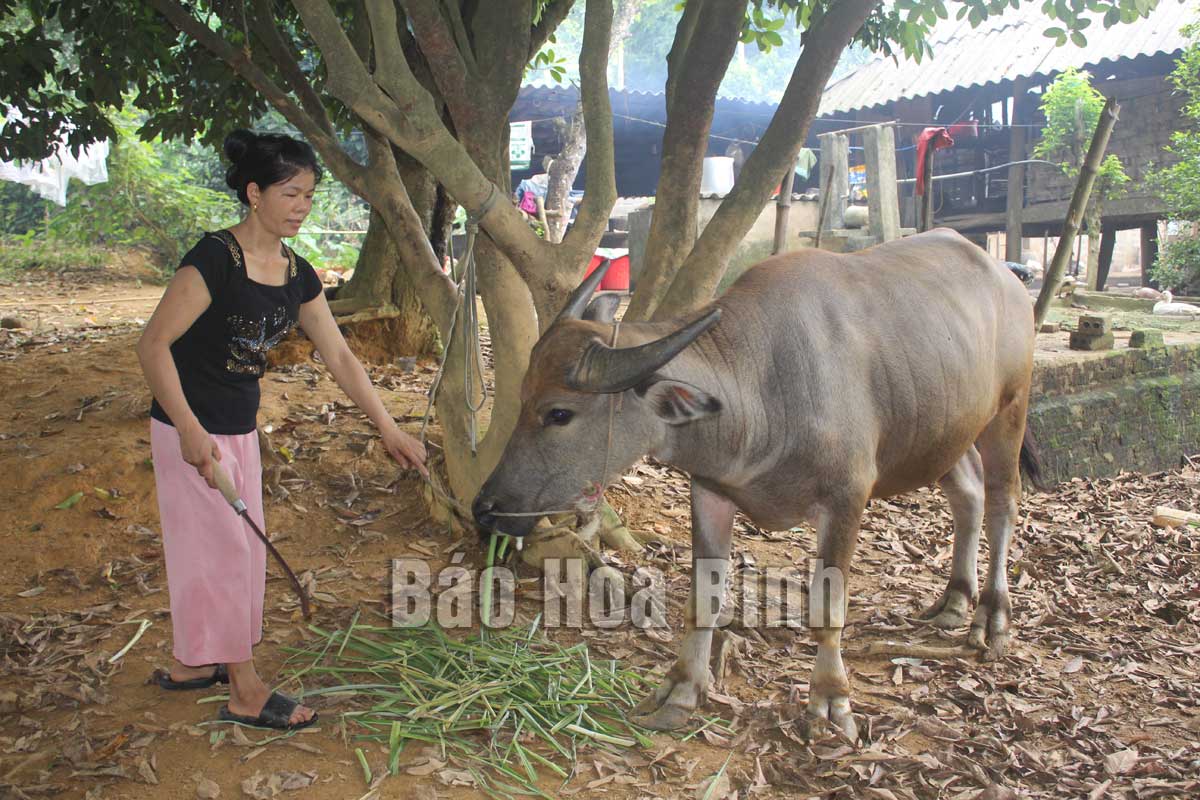
(HBO) - Preferential credit policy has accompanied poor and policy beneficiaries households in Hoa Binh, a mountainous province with many difficulties, for decades. It has become an important driving force to help the poor gradually overcome challenges, making steady progress in poverty reduction and hunger eradication.
Photo: Thanks to social policy loans, the
family of Bui Thi Hoa, residing in Kho hamlet, Chi Dao commune (Lac Son
district) has invested in animal husbandry and escape poverty.
Chi Dao is a remote commune of Lac Son district where people's living
conditions are facing difficulty. Poor and near-poor households account for
over 40 percent of the commune's population.
Quach Cong Thai, Chairman of the commune People's Committee, emphasised that
social policy loan is one of the most important driving forces in the commune's
hunger eradication and poverty reduction.
In recent years, thanks to access to social policy loans, many poor, near-poor
households and social beneficiary policy families have raised buffaloes and
cows, pigs and chickens, and growing doi (Talauma), also known asMichelia
Tonkinensis,for economic development and increase their income.
Up to now, the total outstanding loans under social policy credit programmes in
the commune has reached over 11 billion VND with over 500 households receiving
loans. According to the chairman of the commune People's Committee, as many
people lost their jobs due to the COVID-19 pandemic, the timely disbursement of
policy capital has helped reduce difficulties for them.
Not only people in Chi Dao commune but also those in other localities have
benefit from social policy loans.
The COVID-19 pandemic has affected all aspects of people’s social life over the
past two years, however, the Vietnam Bank for Social Policies’ branch in Hoa
Binh province has strived to mobilise sources and provide loans for poor
households and other policy beneficiaries.
Nguyen Minh Hung, Director of the branch said the total outstanding loan
balance from policy credit programmes in the province has surpassed 3.5
trillion VND (over 153.8 million USD), with over 123,000 needy households as
borrowers.
From the beginning of the year until now, the loan turnover has reached over
896 billion VND, helping over 25,000 customers access loans for production,
business, and social security.
Through preferential credit policy, nearly 2,000 workers got jobs and over
12,000 clean water and environmental sanitation works were constructed. As many
as 19 houses were built, 39 workers were able to go abroad for working, and 31
students and students in difficult circumstances could continue study thanks to
such loans.
Social policy loans have continued to make practical contributions to
sustainable poverty reduction, acting as a driving force to accelerate the
progress of the new-style rural development programme as well as to limit shark
loans in the province./.
More than just an information technology teacher, Bui Van Nien is an inspiring figure who has nurtured the scientific curiosity and creative spirit of students in Vietnam’s ethnic minority communities.
Da Bac is the most disadvantaged mountainous district in Hoa Binh province, with ethnic minorities accounting for about 90% of its population. Over the past years, the district has mobilised resources to implement ethnic policies to improve the quality of life of local people.
In recent years, Hoa Binh province has consistently prioritised the protection, care, and education of children, particularly those from ethnic minorities and disadvantaged backgrounds, by creating a safe, healthy, and nurturing environment for their all-round development.
The Steering Committee for Tobacco Harm Prevention and Control of Hoa Binh province, in coordination with the Tobacco Harm Prevention and Control Fund, held a ceremony on May 28 in response to the World No Tobacco Day (May 31) and the National No Tobacco Week (from May 25 to 31). The event was chaired by Nguyen Van Toan, Standing Vice Chairman of the provincial People’s Committee and head of the Steering Committee.
Since 2021, the Center for Industrial Promotion and Industrial Development Consulting (CIIDC) under the Department of Industry and Trade has been implementing a school lighting model as part of the plan for using energy efficiently and economically in Hoa Binh Province in the pẻiod of 2021 - 2025. This model not only aims to improve the learning conditions and enhance the education quality, but it also promotes the message of energy saving, energy security, environmental protection and contributes to the goals of socio-economic development.
In the 2024 - 2025 school year, the entire Hoa Binh provincial education sector includes 520 educational institutions and schools. Among them are 13 ethnic boarding schools with 153 classes and 4,487 students. Four of these schools have met national standards, reaching 30.7 percent.



